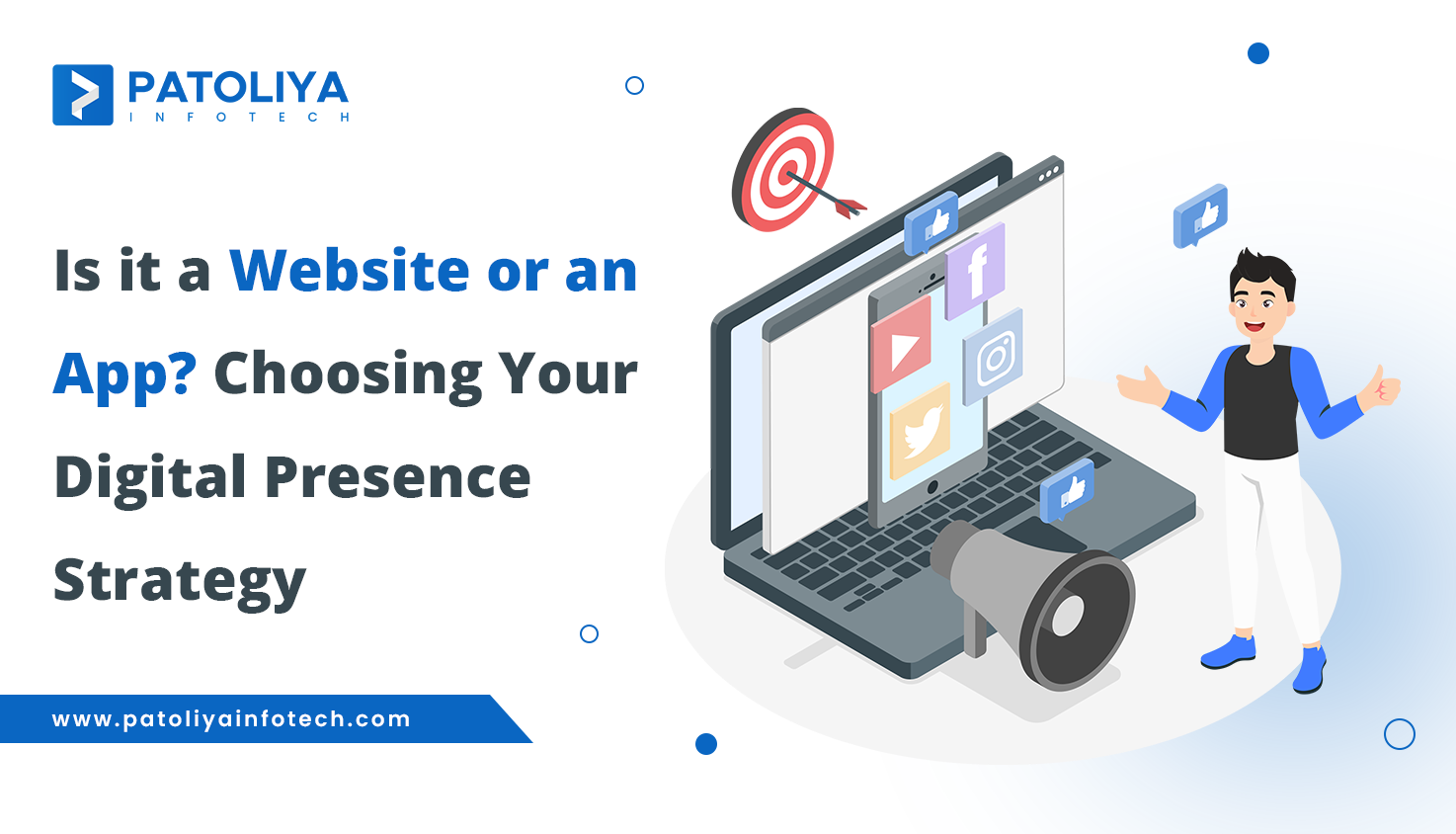Is it a website or an app? Deciding what to build first

Table of Contents
Website vs. app: These days, having a strong online presence is not optional; it is imperative. All businesses, from start-ups developing their brand identity to well established businesses seeking to grow, should take note of this. But there might be unique challenges while traversing the digital world. It's usually difficult to choose between a website and a mobile app.
Websites and apps have various benefits and serve different audiences for different reasons. Websites give a thorough platform for showcasing your services, contact details, and brand narrative. They are excellent at providing in-depth information and serving as a permanent online shop that is accessible from any kind of gadget.
Conversely, real-time interaction and user engagement are given priority in mobile apps. provide features that are ideal for interactions while on the go, such as location-based services, push alerts and a simplified user interface.
You must give your target audience and company objectives careful thought before making this important decision. In the rapidly changing digital era, knowing more about the features of websites and applications can enable you to make decisions that will advance your company.
Understanding the Purpose of Website vs. app
There are several ways to develop a presence for individuals and corporations in the digital world. However, knowing the goals of your project is essential to choosing the best platform. Here is a summary of the main factors to take into account when choosing between creating an app or a website.
Websites are excellent for promoting brand recognition and information display. When you want to give thorough information about your business, goods, or services, these are perfect. Any internet-connected device, at any time of day, may access a well-designed website, which acts as a digital brochure.
Website is also skilled at content marketing techniques; you may provide guides, tutorials, or press releases to build a loyal readership. E-commerce features may also be integrated into websites, allowing for smooth online transactions.
Mobile applications, on the other hand, provide a more customized and engaging user experience. Applications are a good match for projects like fitness monitors, ride-hailing services, and social networking sites that need real-time functionality. Apps can offer more functionality by utilizing the special capabilities of mobile devices, such as accelerometers, cameras, and GPS.
Direct user contact via push notifications encourages user engagement and encourages recurring use. However, building and maintaining an app might require a lot of resources, and it may be difficult for users to utilize it because they have to download and install it on their devices.

Analyzing Your Audience
Identifying your target market is a critical first step in making sure your platform succeeds. To do this, compile a thorough profile of the consumers you believe would most benefit from your product. A vital starting point is to comprehend their demographics, including age, region, and socioeconomic status. But a thorough comprehension goes beyond their psycho-graphics, their requirements, wants, problems, and preferred ways to communicate.
Comprehensive market research is a crucial element of this procedure. Surveys and polls, which are quantitative research methodologies, can yield statistically significant information on the demographics and usage habits of users. Adding qualitative research to this, such as user interviews and focus groups, provides valuable insights into the motives and frustrations of users as well as the language they use to express the difficulties they face.
You may better understand your target audience's experiences and customize your platform's features and functions to suit their wants and preferences by immersing yourself in their environment. This user-centric strategy creates a platform that is more successful and long-lasting by encouraging a sense of connection and loyalty.
Evaluating the Market
Consider your options carefully and evaluate the competitive environment before launching into development. Developing a plan for your product or service is similar to this market analysis. Finding the current players in your industry and their products is essential, just as a captain wouldn't set sail without knowing the currents and the risks.
Who are the immediate rivals of your business? Does your target audience have any indirect rivals that might satisfy a comparable need? You can identify what sets your product or service apart from the competition by studying the market. The trick is in knowing how to set oneself out from the crowd. Is its functionality better? Are you offering superior client support? a price model that disrupts? It is essential to identify your unique value proposition (UVP) to gain market share and build your brand.
Your rivals are not the only ones included in this assessment of the market. Market trends are another thing that astute firms closely monitor. Which customers are most likely to favor? Does your industry stand to benefit from any technology advancements? You may spot chances for innovation and customize your offering to better satisfy changing consumer needs by keeping an eye on these trends. Your ability to anticipate future trends and changes in the market will help you succeed in the long run.
Assessing Budget and Resources
Whether a website or a mobile application best meets your objectives depends on several factors, including budget and resource allocation. Websites usually have a more economical procedure for construction and upkeep. This is because they make use of well-established and well-maintained web technologies.
On the other hand, because mobile app development requires platform-specific code and capabilities, the initial expenses are frequently greater. Apps also require constant support and upgrades to remain compatible with changing operating systems and user requirements. Making an educated selection requires a complete financial analysis that accounts for both development and ongoing maintenance costs.
Explore the complete guide, "Guide to Enterprise Mobile App Development."
Choosing the Right Platform
You're ready to choose the best platform for your project now that you've thoroughly considered the major factors. Since they are automatically accessible from any internet-connected device, websites are excellent at drawing large audiences. Because technology is so pervasive, it allows for easy sharing of information and encourages public participation.
Application-based user experiences, on the other hand, are more customized and dynamic. However, the requirement for user download and installation accompanies this improved feature, which can restrict its initial accessibility. Your project's primary goals will ultimately determine the outcome.
A website might be the best option if getting as much exposure to your audience as possible is your top priority. But if you're more interested in focusing on a highly customized and engaging user experience, an application could be a better option.


Wrap Up
When deciding between a website and a mobile application, it is crucial to have a long-term vision for your online presence. Above all, it is important to assess projected user growth trends. When your user base grows, would your platform need to be able to scale to accommodate the increased volume of users? Selecting a platform with the built-in ability to grow with your organization is essential to attaining long-term prosperity. Your company will be better equipped to face the future with confidence and agility if you carefully choose a platform that effortlessly supports expansion.
A project's goals, target audience, budget, and available resources will determine whether to construct an app or a website first. You may establish a successful online presence that lives up to user expectations by carefully weighing these variables and selecting the platform that best matches your goals.



